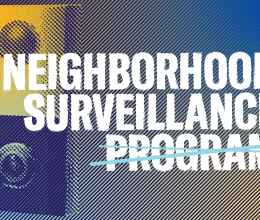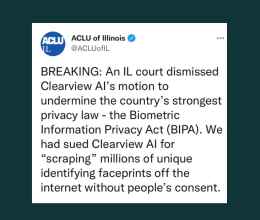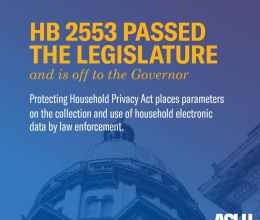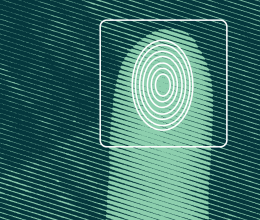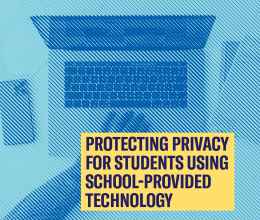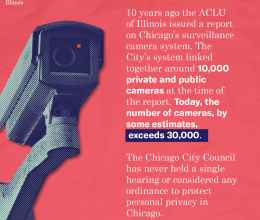
UPDATE 8/27/21: HB 2553 was signed into law by Governor Pritzker. Read more here.
As technology continues to grow and “smart” technology quickly makes its way into our homes, Illinois law must protect our data and us. The Protecting Household Privacy Act is a one-of-a-kind piece of legislation that places parameters on the collection and use of household electronic data by law enforcement.
Smart household technology has grown at an unprecedented pace. The same virtual assistants, security cameras, and smart appliances that used to appear on TV have now become a part of many American households. Such devices can provide convenient benefits to their owners and offer the promise of a "safe and smart home," with powerful monitoring and automation capabilities.
Equipped with sophisticated sensors, including microphones and video cameras, many of these devices have the capacity to collect, store and transmit an almost limitless amount of personal and private information from within the home. Without regulation, companies could share this information with law enforcement agencies without our knowledge.
To safeguard the privacy of innocent persons using this technology, the Protecting Household Privacy Act (PHPA) steps in to protect sensitive information collected by these technologies. Consistent with the Fourth Amendment and the United States Supreme Court's recognition that an individual's expectation of privacy is greatest within their home, the PHPA protects household electronic data and does not allow law enforcement agencies to acquire such data from a private third party, unless:
- The law enforcement agency first obtained a judicial warrant;
- The law enforcement agency is responding to a call for emergency services;
- There is an emergency situation:
- involving a clear and present danger of imminent death or great bodily harm resulting from a kidnapping, abduction or holding of hostage by force or the threat of imminent force and the household electronic data is necessary;
- there was no previous notice of the emergency;
- the household electronic data is necessary and the only potential data available to prevent imminent death or great bodily harm; and
- the data must and can be accessed before a warrant could be issued to prevent imminent death or great bodily harm.
- The owner of the household electronic device, or person in actual or constructive possession, consents to voluntarily provide the desired data.
Additionally, if any information is collected by a law enforcement agency in an emergency situation as described above, they must still make an application for a warrant within 72 hours to approve the collection of the data. If the application is denied, the information is considered inadmissible.
Even when household electronic data is lawfully obtained in an emergency or pursuant to a warrant, the PHPA mandates that it be destroyed within 60 days, unless there is a reasonable suspicion that the information contains evidence of criminal activity or the information is relevant to an ongoing investigation.
Illinois citizens should not have to choose between using household technological conveniences and preserving the right to privacy in their home. The PHPA is a critical step to protect our information and limit law enforcement’s access to it in the absence of a valid exception. Without the PHPA, we are at the mercy of these companies – who collect data as part of their business model – to protect our privacy. With the PHPA, we are automatically protected from invasive practices like a ‘backdoor’ created for law enforcement.

